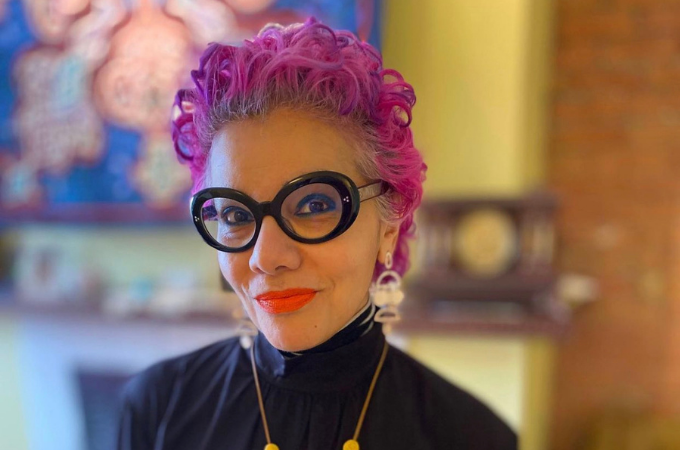
Mona Eltahawy met Robert Rutledge on Twitter on January 16, 2015, and the rest, as they say, is history. I recently stumbled across the fateful tweets that brought them together and found their love story compelling. Eltahawy is a no-nonsense, militant feminist, known for her loud, passionate outcry against all things patriarchal. Naturally, her love story instantly reminded me of bell hooks’ statement: “to choose feminist politics…is to choose love,” a statement she makes in an essay on romantic love. Something about Eltahawy’s life—her beautiful love story and her feminist advocacy—conveyed the spirit of bell hooks’ statement. I wanted to know more, so I reached out to her to see if she’d be up for helping us unpack what links love, romance, and feminist politics. Thankfully, she said yes.
Eltahawy is a passionate voice for global feminism. She was born in 1967 in Port Said, Egypt and grew up in the UK and Saudi Arabia. She has dedicated her life to advocating for women’s rights and the rights of others excluded and mistreated in patriarchal systems. A fervent believer in storytelling as a feminist practice, she talks openly about being a survivor of sexual assault and, more recently, about her experience with menopause, which she will be exploring in more detail in a forthcoming edited collection titled Bloody Hell! And Other Stories: Adventures in Menopause from Across the Personal and Political Spectrum. Her books Headscarves and Hymens: Why the Middle East Needs a Sexual Revolution (2015)and Seven Necessary Sins for Women and Girls (2019) are searing critiques of patriarchal systems as well as guides to feminist resistance.
We are honored to host her on our monthly interview feature and delighted to share with you her take on what feminism brings to the question of love.
[The interview was conducted via zoom and has been edited for length and clarity.]
***
Brittle Paper
Hello Mona. Let’s jump right in. What is your attitude towards the concept of love?
Mona Eltahawy
Okay, that’s a big one.
Brittle Paper
Everybody has an idea of what love is or is not? How would you define or talk about love?
Mona Eltahawy
I have to be honest and say that I don’t often talk about love. I don’t often bring up love. I don’t see love as a concept or as an idea in my work. But that changed when I read bell hooks’ Wounds of Passion: A Writing Life. In the introduction, she says that a large part of her work is to insist that a woman, especially a black woman, write about romance and sex, and still be taken seriously in the way that a man can. And to talk openly, for her as a black woman in romantic relationships with a black man, so that her relationship can be taken as seriously as romantic relationships, say, between white authors. She brought up Sylvia Plath and Ted Hughes and the ways that white readers will flock to all these books about famous writers who are in romantic relationships. bell hooks wants to center black writers who are in romantic relationships. That was really the first time I realized it was important to talk about my romantic relationships, my sexual relationships, to take up that space. Whereas before, I always thought, “this is not something I want to talk about because I’m being serious, and I’m a feminist. And this isn’t what feminists do, you know.” But then I read books that are like, Okay, I gotta think about this.
Brittle Paper
What shifted for you? Yes, bell hooks initiated something. But how else did your perception of love and its place in your work and your thinking change?
Mona Eltahawy
Well, I was able to figure out for myself how I wanted to approach romance. Romantic relationships and sexual relationships. And I do make a distinction because sometimes they’re together, and sometimes they’re not.
Brittle Paper
Let’s stay a bit with this distinction you make between romantic and sexual relationships. It’s very important: the difference between love within the context of romance, and then love within the context of sex.
Mona Eltahawy
I spent years thinking about this difference. I want to preface this with my own personal journey because I have been very honest about my own personal journey in both of my books and in many of my essays. I was raised with the teaching that I should not have sex until I got married. I was taught that I should get married to a Muslim man, preferably an Egyptian Muslim man. But at the age of 17, I began to have nightmares that I had married the wrong man. I would wake up terrified. So, I became very anti-marriage. A whole bunch of aunts and uncles tried and failed. But my parents, thankfully, completely left me to decide whether I wanted to get married or not. My dilemma then became, okay, I don’t want to get married. I can’t find anyone I want to marry. Most men I knew were terrified of me. And I didn’t want to marry a man who was scared of me. I got fed up waiting. So, I decided, you know, fuck this. I’m done. I am not going to wait till I get married to have sex with someone. At the age of 28 or 29, I asked a man out, specifically with the goal of having sex with him. I often say that ever since then I have succeeded in fucking the guilt out of my system. [laughs]. It’s been over two decades—I am now 54—and I have learned from my experience that I want to have sex with people I am in love with. I have had sex with people I am not in love with. I have also, in the past two decades, realized that I am not monogamous. I stopped being monogamous. I’m polyamorous. My insistence on freedom is founded on polyamory or ethical non-monogamy. It is called various things. And I’ve also been much more open about being attracted to all genders, not just men. This a long-winded way of tracing how I moved from a culture of purity to how I wanted to handle my sexuality, my desire for sex, the separation of love and sex, and also rejecting monogamy and rejecting heteronormativity. That is all part of how now as a feminist I approach romance and sex.
Brittle Paper
Polyamory is not your Hollywood ideal of forever love, right? Love in mainstream western culture is typically heteronormative and monogamous. So, tell us. What have you found to be satisfying, expansive, or beautiful about exploring polyamory?
Mona Eltahawy
What I found is that it is completely in tune with basically the goal of my life. The goal of my life is freedom, freedom in all its aspects. And I learned this through trial and error. Not because I picked up a book and it told me that polyamory is a great thing to explore. I discovered it through trial and error. I would be involved in a monogamous relationship and would feel suffocated. That was not the way that I wanted to lead my life. I don’t want to possess anyone, and I don’t want to be possessed by anyone. When I later read books about queerness, anarchism (because I’m an anarchist), polyamory, and so on, I saw, in retrospect, what I was doing was rejecting these structures. I came to the theory after I had already lived the practice. Not the other way around. Today, I’m able to point people to paragraphs from essays about queer anarchism and why polyamory is central to it. It is a rejection of the heteronormative capitalist lifestyle that tells us that a man and a woman must couple in order to reproduce children who are then going to be workers who then end up being donated to the capitalist worker machine. I didn’t know any of this when I discovered that as Mona, the feminist, the path to freedom for me, when it comes to romance and sex is polyamory. I’m glad I found the theory, but it came out of the practice.
Brittle Paper
You mentioned not wanting to possess anybody or be possessed by anybody. That reminds me of bell hooks essay on love in the collection Feminism is for Everyone. In the essay, she talks about how patriarchal systems distort what love is. What would you say is the problem with romance in a patriarchal culture?
Mona Eltahawy
The way romance is portrayed to us by the patriarchy is very much within the gender binary. And it’s within heteronormative restrictions in which a woman—a cisgender, heterosexual woman sits and waits to be chosen and taken as some kind of prize. This is a culture that fosters the kind of violence we see in the incel trend–terrorists who go around killing people because they haven’t found a woman that they can then own. As if there’s some kind of war over women, as if we’re some kind of resource that they’re complaining they don’t have. That’s how patriarchy portrays romance. If you’re a good woman—there’s a whole list of what a good woman is—you will be chosen by the ideal man, who is rich, able bodied, and defined by some kind of Supremacist logic. We see this in everything from fairy tales to the way girls are raised with the idea that being a bride is the ultimate goal. So many women say: “Oh my wedding day was my dream, it was always my dream.” Look, if you want to get married, I’m not going to prevent you from getting married. But let’s deconstruct why. The wedding industry is definitely a driving force of capitalism. Why do Hollywood romances end up with coupling, even queer films? Now that we’re seeing more same sex relationships on screen, it always ends up with a man and a man or a woman and a woman. We are socialized into thinking of romance as coupling, having a family, though more and more people are unpacking the nuclear family as the foundation of patriarchy.
Brittle Paper
You’ve written about violence as one of the quintessential ways that patriarchy manifests itself. How might conceptions of romance in a patriarchal culture feed into this logic of violence?
Mona Eltahawy
At the heart of patriarchy is the idea that women give, and men take. They feel that they’re entitled to be violent, to terrorize the rest of us. And some end up killing women. But every now and then, some men will also be killed during their acts of terrorism. There is intimate partner violence, in which again, patriarchy socializes men. The intimate partner violence that we see adult men subjecting their female partners to can be traced all the way to acts of violence in high school, where you hear a boy asks a girl out, and she refuses to go out with him. We see this in so many American high schools, cases where a girl rejects a boy’s advances, but he feels he is entitled, so he hurts her. You can tie that to the emotional violence, which is a form of terrorism, portrayed in Hollywood where a man is interested in a woman, and she’s not interested at first. But he keeps at it, stalks her, keeps pushing and pushing and pushing until she finally gives in. Even though we don’t see this particular man beat or sexually assault a woman in a film, you can trace a direct line between that and intimate partner violence because it fosters the notion that a man is entitled to a woman, her attention, her body, all of that.
Brittle Paper
Knowing what love and romance looks like in a patriarchal system, what might it look like in a feminist imaginary? What might a feminist love story look like?
Mona Eltahawy
I’m not a fiction writer. I’m a nonfiction writer. The way I approached the idea of storytelling is to tell my own personal stories because I think that personal storytelling is part of the feminist revolution. The most subversive thing a woman can do is to talk about her life as if it matters because it does. This is going back to bell hooks and talking in a very, very personal way, about my relationships, about the ways that I approach romance and sex. And I do this in the hope that when I share my lived experience, someone who has been socialized in a way similar to the way I was, can identify with it and be inspired to share their lived experience as a way of resisting patriarchy, as a way of resisting that conservative socialization. And not just for someone who was raised in a Muslim Egyptian home, but anyone who was raised in a conservative environment, who can identify with the ways that I was raised. That’s the power of stories, our personal stories and not just fictional stories. I’ve been writing more recently about my two abortions. I’ve written more recently about my choice to be child free. Robert, my beloved, has been sharing about how we met online. Our anniversary of when we met in real life is coming up in February. Whenever we share our stories, the number of young women who write to him and me and say this is so important because I’ve always wondered if I’ll ever be able to find someone who will love me the way I am. I want them to look at my story and say if Mona can find someone that tells me there’s hope for me! [Laughs]
Brittle Paper
[Laughs] Valentine’s Day tagline: If Mona can find love, you can!
Mona Eltahawy
Robert writes back to them and says: “if anybody tells you to change, say no to them. Let them love you exactly as you are.” And I tell him you know, you should be like Professor Love. [Laughs]
Brittle Paper
Do you watch Hollywood rom coms?
Mona Eltahawy
Oh, yeah, tons. Robert and I we both love rom coms so much.
Brittle Paper
What is one of your favorites? Even if it’s one of the ridiculous ones.
Mona Eltahawy
Every Christmas, one of our traditions is to watch When Harry Met Sally. It’s not ridiculous. You know, it’s one of the big ones out there. It was written by Nora Ephron. It handles a lot of deep issues. So, we watch that every year. We do a whole variety. We watch some really silly ones. We watch queer ones, as well. Casablanca isn’t considered a romcom, obviously, but it is one of those ultimate romances. I watched it for the first time, this past New Year’s Eve.
Brittle Paper
Let’s take When Harry Met Sally as an example. If we rewrote the film as a feminist representation of what love looks like, what kinds of changes would we make?
Mona Eltahawy
Ah, that’s a good question. The movie does touch on several things that I would consider feminist. Do you remember the scene in the diner when she tells Harry: “you really think that every woman you’ve ever been with has had an orgasm?” The scenes that disappoint me the most are the ones where she talks about marriage. That entire middle part where she basically falls apart because her ex-boyfriend Joe is getting married. I would completely rewrite that. I’d be like, “Fuck, Joe! Let’s go out and celebrate.” Why is this idea that Joe is getting married destroying her? It’s because we are socialized with the idea of waiting to get chosen. And if this man that we choose doesn’t choose us, we fall apart thinking there is something wrong with us.
Brittle Paper
You have argued that a feminist response to patriarchy has to include violence. Given the importance of violence in your framing of a feminist resistance, I’m curious to know if there is any space for love as a way of responding to patriarchy? Is there a feminist response to patriarchy that takes the form of love as opposed to violence?
Mona Eltahawy
The way to respond to patriarchy with love is to deconstruct the ways that the patriarchy tells me love should be. To stand up to patriarchy using love is to say no to “love hurts,” to say no to the kind of stalkerish terroristic kind of idea of love, and to insist that love be as free as I want to be. I talk about profanity a lot. The reason I say fuck and swear a lot is because I want my language to be as free as I want it to be. That’s how I want love and sex as well. I want my romantic and my sexual lives—plural— to be as free as I am. They’re all part of my Feminist Revolution, which aims for freedom and liberation, not just for me but for my partner and for other people that I will be romantically and sexually involved with. That’s my answer to how do we stand up to patriarchy with love, as opposed to violence. I met bell hooks in New York in 2014 because she would come every year to speak at the New School. She said that through transgression, we expand the spaces of life in ways that we then are truly safe and free. Yeah, transgressing and using desire as a disruptive force, that for me is part of love. Part of that is understanding that something like desire is a very robust thing. It is not passive. I don’t just use the word “sex,” but you know, “fucking.” It’s important to say that word. In the run up to marriage equality in the US, you would hear “Love is love.” But you know what, it’s not just about love. It’s about fucking too. It’s about “I will fuck who I want to fuck, and it’s none of your fucking business.”
Brittle Paper
How do you feel about Valentine’s Day?
Mona Eltahawy
My complete anti-Valentine’s Day feelings began in Egypt many years ago when this man that I was with at the time forgot Valentine’s day. We were together for three years, and he forgot. I was so upset. And then I was like, “What the fuck am I doing? What kind of feminist am I that I’m so upset that my boyfriend forgot Valentine’s Day?” It brainwashed me, you know. I was like, That’s it? No, I’m bringing the garlic out. No more Valentine’s Day.
Brittle Paper
Valentine’s Day is somewhat problematic for the ways in which it has been commercialized, but, for many, it continues to be a day for reflecting on love. As February 14th approaches, what would you like folks to keep in mind?
Mona Eltahawy
Well, I would really love for everyone to sit down and unpack the ways that they’ve been socialized into what to expect, what to agree to, and what to aspire to. Because when we unpack that socializing, we address what you just said about how Valentine’s Day has become this kind of capitalist festival that has very little to do with the ways that we feel about each other and a lot more to do with what we buy on that day, and who was chosen or wasn’t. Then people feel utterly rejected that day. We have to wrestle with not just the ways that Valentine’s Day pushes us to buy and spend and all of that, but we should also ask: who is worthy or unworthy or considered worthy or unworthy of romance? When we do that, we bring up issues like Eurocentric notions of beauty that place white femininity at the top of this hierarchy that constantly tells us that there’s a hierarchy of desire and attractiveness. Take Valentine’s Day as an opportunity to ask who is considered worthy of romance, who is considered worthy of being chosen? I’m glad to see more discussions about fat people, people who are considered at the lower end of the hierarchy of desirability, and all of us who are not conventionally attractive according to white feminine notions of beauty. So, this is how I hope people would approach this Valentine’s Day.
Brittle Paper
That’s a beautiful message. I love the idea of thinking about others who are excluded by the very terms of this celebration of love. Do you have any thoughts on how we can incorporate love into our practice, our politics, our daily lives?
Mona Eltahawy
This time we’re living in, where we’ve entered year three of this global pandemic, is a great time to ask about how we practice love, not just in the romantic context. One of the reasons that the United States has experienced such horrific levels of COVID-19 cases and number of deaths, not just in the US, but around the world, can be directly tied to a lack of love for our fellow human beings. It’s the ultimate in selfishness. This hyper individualism that says, I’m not going to get vaccinated. I am going to be fine. You can’t tell me what to do. The complete upside-down understanding of what freedom means. The United States is suffering from a deficit of love. And yet this is a country where so many of the politicians and the very people who are anti-vaxxers and who have acted so selfishly will in the name of what they call a Christian love go on and on about Christianity and Jesus. And I’m like, where is your Christian love? Where? Those white supremacists who contributed to the reason that we’re entering year three are the ones who clamor the loudest about their Christianity and their white Jesus and their version of Christian love. I see nothing resembling love in the ways that they conduct their lives. I think that this is a perfect opportunity to ask, how much do we really love each other in a non-romantic sense, because that love then has to translate into compassion and kindness and community in ways that the United States currently completely lacks.
Brittle Paper
Thank you so much. this has been beautiful. I can’t wait to share it with our readers. Lots of truths here to help us stay grounded. It’s important to me that we get to hear what you think about love because you’re a militant of feminism.
Mona Eltahawy
Thank you. That means a lot to me. Thank you so much. I know. It’s always a pleasure to speak with you.


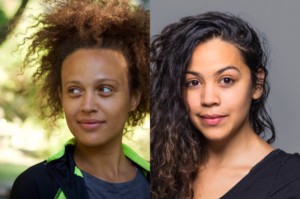
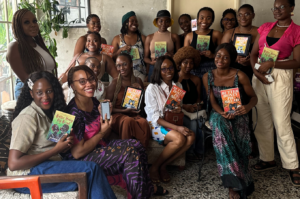
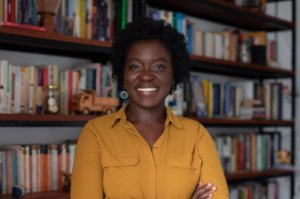
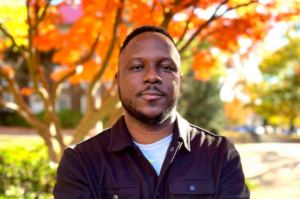

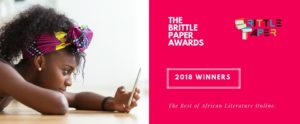

Ugochukwu Anadị February 09, 2022 07:41
After reading this, I know for sure that I'm gonna get all Mona's works and read. It's just a matter of when the money enters. How I love this interview!